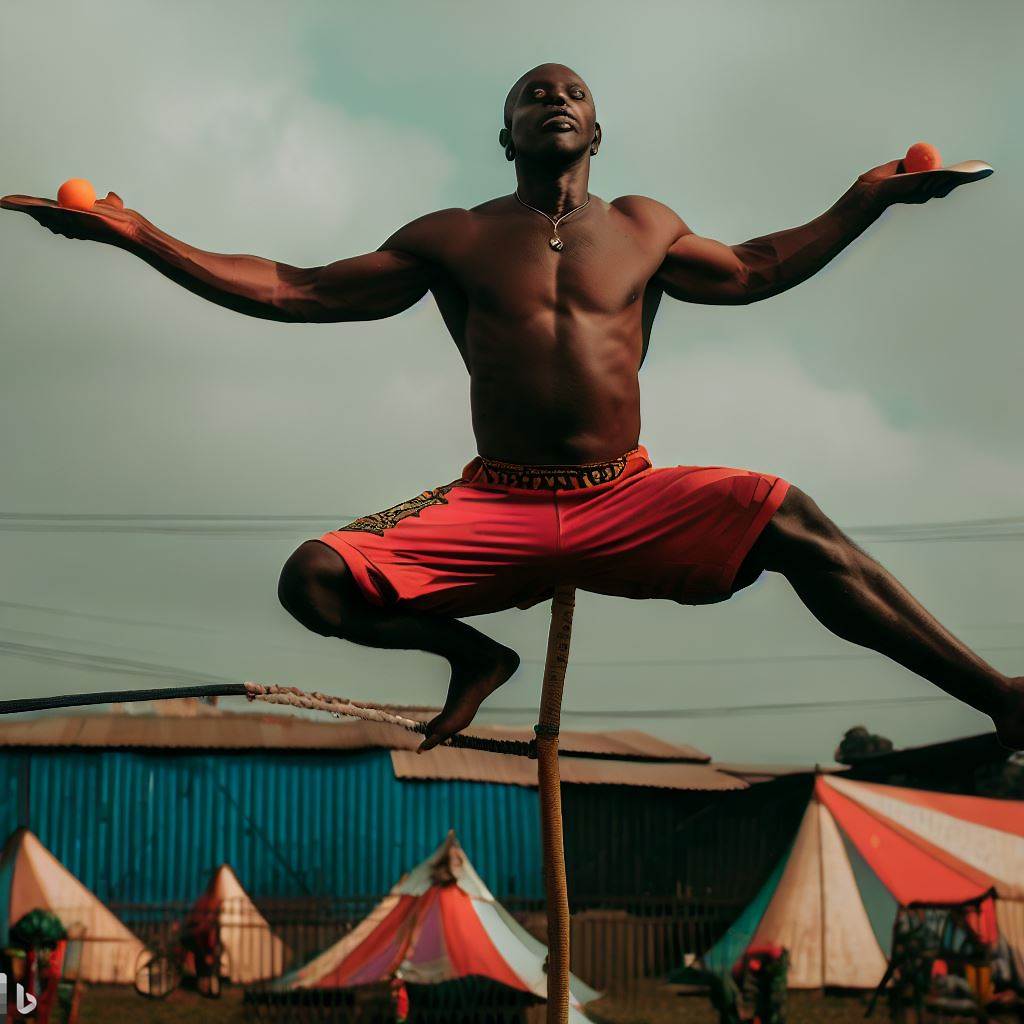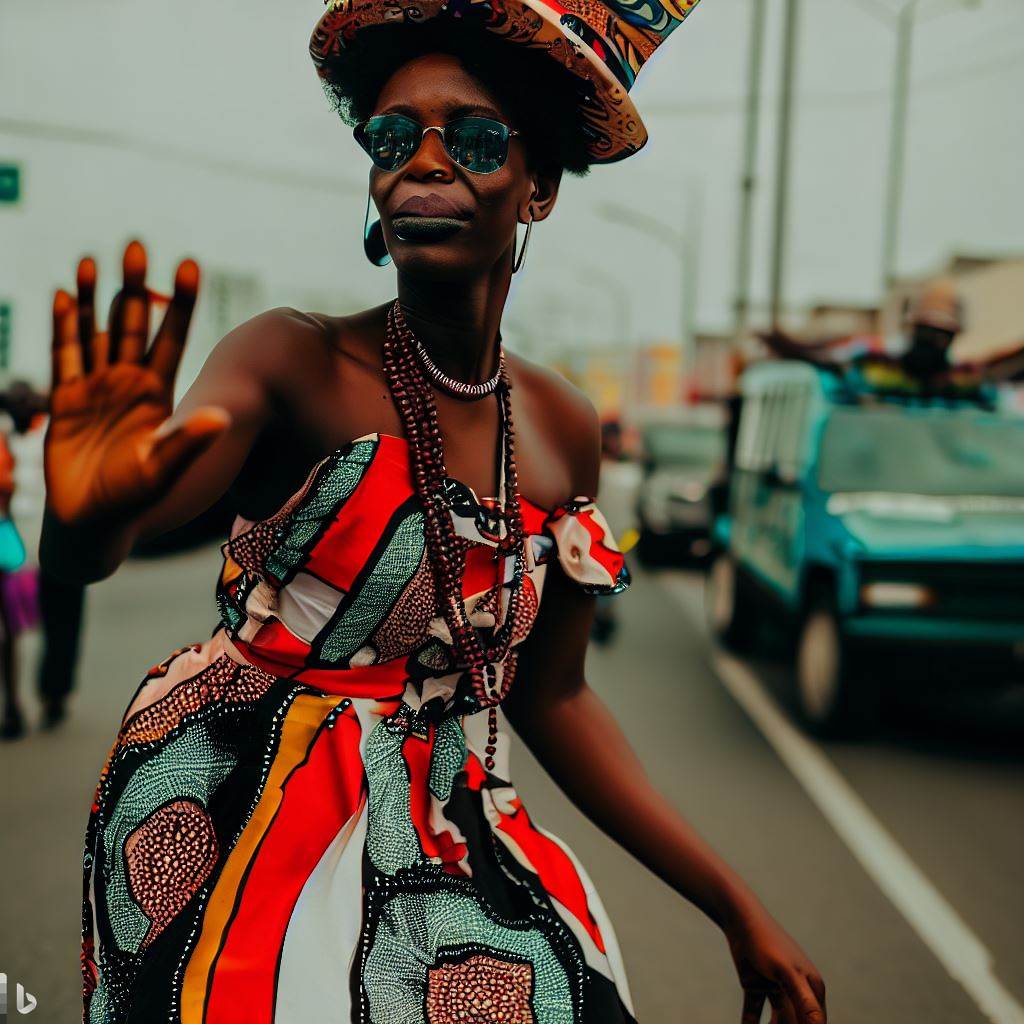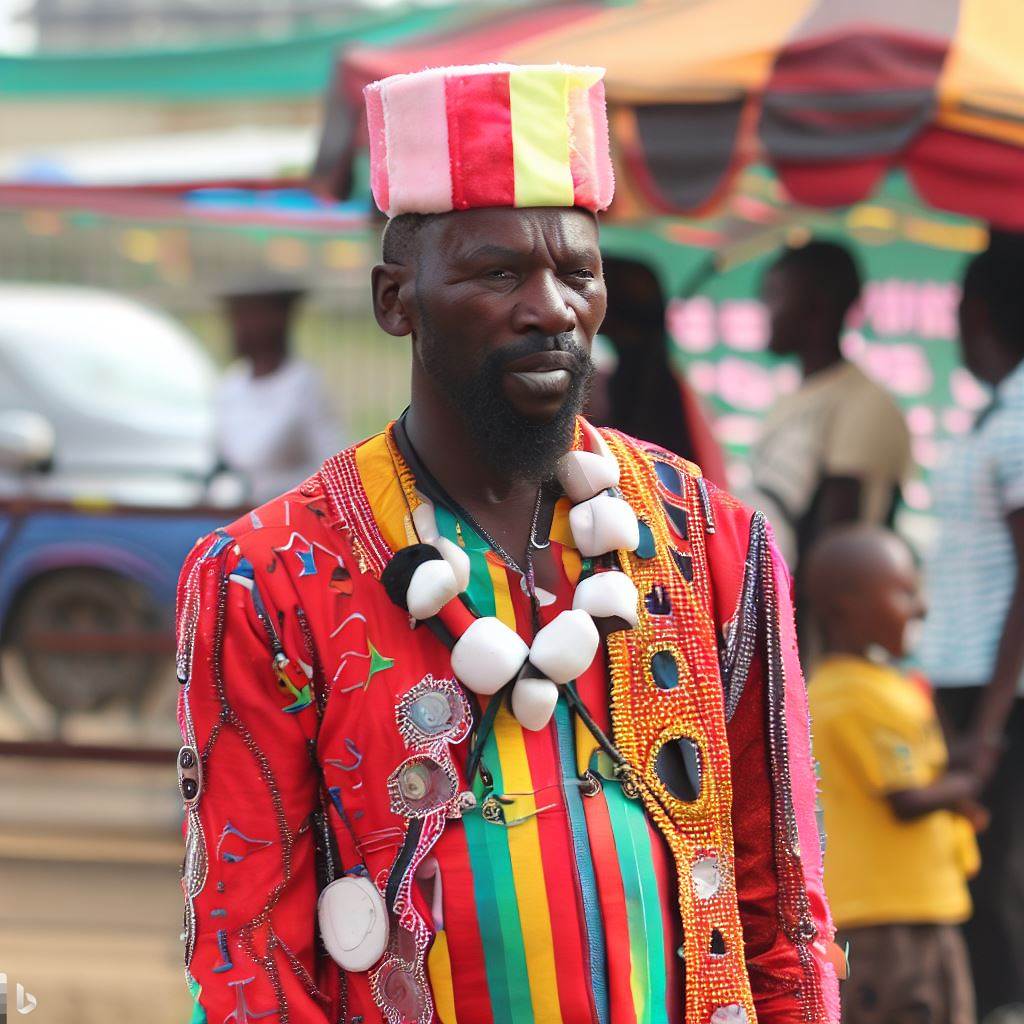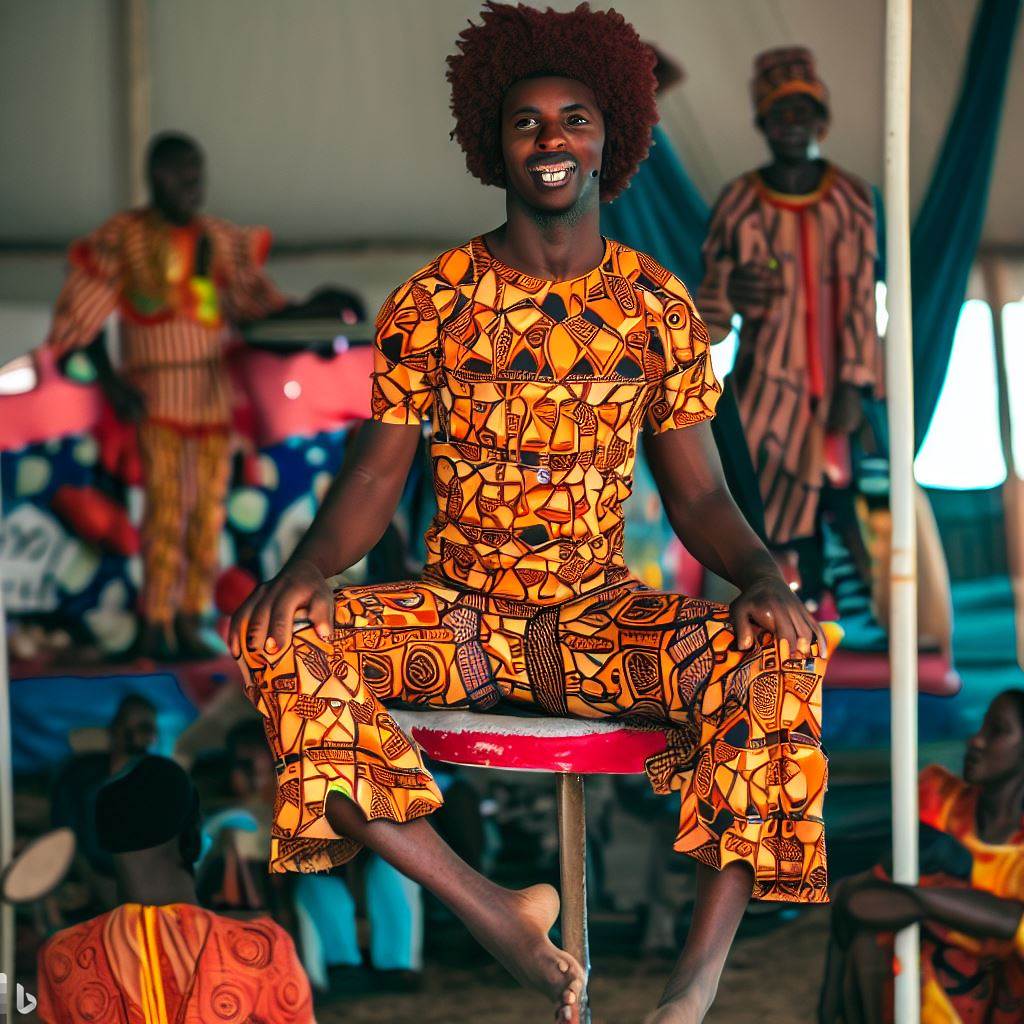Introduction
Nigerian circus performances have a rich history and are a significant part of the country’s cultural heritage.
This section aims to explore how culture influences Nigerian circus performance, emphasizing its impact.
Historical Background of Nigerian Circus Performance
A. Origins of circus performance in Nigeria
- Circus performance in Nigeria can be traced back to the early 1900s.
- It was introduced by European settlers who brought their circus traditions to Nigeria.
- The first circus acts in Nigeria mainly consisted of acrobatics, clowning, and animal performances.
- These acts were performed in small village gatherings and eventually gained popularity.
B. Cultural significance and traditional art forms incorporated in circus acts
- Nigerian circus performance incorporates various traditional art forms, reflecting the country’s diverse cultures.
- Dance forms such as the Yoruba Bata dance and the Igbo Agaba dance are often incorporated into circus acts.
- Traditional music, like the Hausa Kalangu, accompanies circus performances, adding cultural richness.
- Circus acts also include storytelling, using oral traditions to convey Nigerian folklore and history.
C. Evolution of Nigerian circus performance over time
- In the mid-20th century, Nigerian circus performance started to blend traditional elements with modern techniques.
- Acrobats began incorporating new moves and stunts to attract larger audiences.
- The inclusion of fire performances and aerial acts further elevated the spectacle and excitement of Nigerian circus.
- Technological advancements allowed for the use of innovative lighting and sound effects during performances.
- Nigerian circus troupes started to tour internationally, showcasing their unique blend of culture and entertainment.
The historical background of Nigerian circus performance has its roots in the early 1900s when European settlers introduced circus traditions to the country.
Over time, Nigerian circus evolved by incorporating traditional art forms, such as dance and music, and blending them with modern techniques.
This evolution, along with technological advancements, has allowed Nigerian circus to gain recognition and attract audiences both locally and internationally.
The cultural significance and diversity embedded in Nigerian circus acts make them a unique and captivating form of entertainment.
Cultural Elements in Nigerian Circus Performance
A. Traditional music and dance styles in circus acts
The incorporation of traditional Nigerian music and dance styles adds a unique cultural flavor to the circus performance.
Performers synchronize their movements with the rhythm of the music, creating an immersive experience for the audience.
Various traditional dance forms, such as the Bata, Owigiri, or Ekombi, are showcased, captivating spectators with their energetic moves.
The vibrant beats and melodies resonate with the cultural heritage of Nigeria, making it an integral part of the circus performance.
B. Traditional costumes and attire used by performers
Nigerian circus acts embrace the rich and diverse traditional costumes and attire, enhancing the visual spectacle on stage.
Performers adorn themselves in colorful traditional garments, representing different ethnic groups and their unique cultural identities.
These costumes not only reflect the performers’ pride in their heritage but also serve as a visual link to Nigerian traditions.
From the elaborate headgear to the intricately embroidered outfits, the costumes complement the overall cultural theme of the circus performance.
C. Cultural symbols and storytelling techniques incorporated in performances
Nigerian circus performances often incorporate cultural symbols and storytelling techniques, narrating traditional tales and folklore.
The use of symbols, such as traditional masks, represents spiritual or ancestral entities and adds depth to the narrative.
Through acrobatics, juggling, or aerial acts, performers depict stories that are deeply rooted in Nigerian cultural traditions and values.
Audiences are not only entertained but also educated about Nigerian history, customs, and beliefs through these performances.
These cultural elements create a sense of pride and identity among both performers and spectators, fostering a connection to Nigerian heritage.
The impact of culture on Nigerian circus performance can be seen through the incorporation of traditional music and dance styles, costumes, and cultural symbols.
These elements provide a platform for the preservation and celebration of Nigerian cultural heritage.
As the circus acts showcase the vibrancy and diversity of the country, both performers and audiences are immersed in a rich cultural experience.
Nigerian circus performance not only entertains but also educates, creating a deeper understanding and appreciation for the country’s diverse traditions.
Read: Exploring the Role of a Music Publisher in Nigeria’s Industry
Influence of Nigerian Cultural Diversity on Circus Performance
A. Effects of ethnic diversity on circus acts
- The inclusion of diverse ethnic groups in circus acts adds richness and depth to the performances.
- Various ethnic practices and traditions can be incorporated into acrobatics, juggling, and other circus disciplines.
- This diversity allows performers to showcase their unique skills and talents, creating a vibrant and captivating experience for the audience.
- With different ethnic backgrounds, performers bring their distinct movements, music, and costumes, enriching the overall performance.
B. Representation of different Nigerian cultures in performances
- Nigerian circus performances provide a platform to celebrate the diverse cultures present in the country.
- Each circus act can be designed to showcase the traditions, dances, and folklore of specific Nigerian tribes or regions.
- By highlighting various cultures, circus performances promote cultural awareness and appreciation among the audience.
- Audiences get the opportunity to experience the richness and diversity of Nigerian heritage in a visually engaging manner.
C. Role of cultural exchange in enhancing circus performances
- Cultural exchange plays a crucial role in enhancing Nigerian circus performances.
- Interaction between different cultures allows artists to learn new techniques and performance styles.
- Through collaborative efforts, performers merge different cultural elements to create unique and innovative acts.
- Cultural exchange fosters creativity, pushing performers to experiment with new ideas and incorporate cultural diversity into their acts.
- By promoting cultural exchange, Nigerian circus performances become dynamic platforms for artistic growth and exploration.
The influence of Nigerian cultural diversity on circus performance is undeniable.
The effects of ethnic diversity on circus acts contribute to a more vibrant and captivating experience.
Representation of different Nigerian cultures in performances allows for the celebration of heritage and promotes cultural awareness.
Furthermore, cultural exchange enhances circus performances by providing an avenue for learning and collaboration.
Nigerian circus acts are transformed into showcases of artistic growth and innovation through the incorporation of diverse cultural elements.
Ultimately, the impact of culture on Nigerian circus performance is a testament to the power and beauty of diversity.
Read: Behind the Scenes: A Day in a Nigerian Costume Designer’s Life
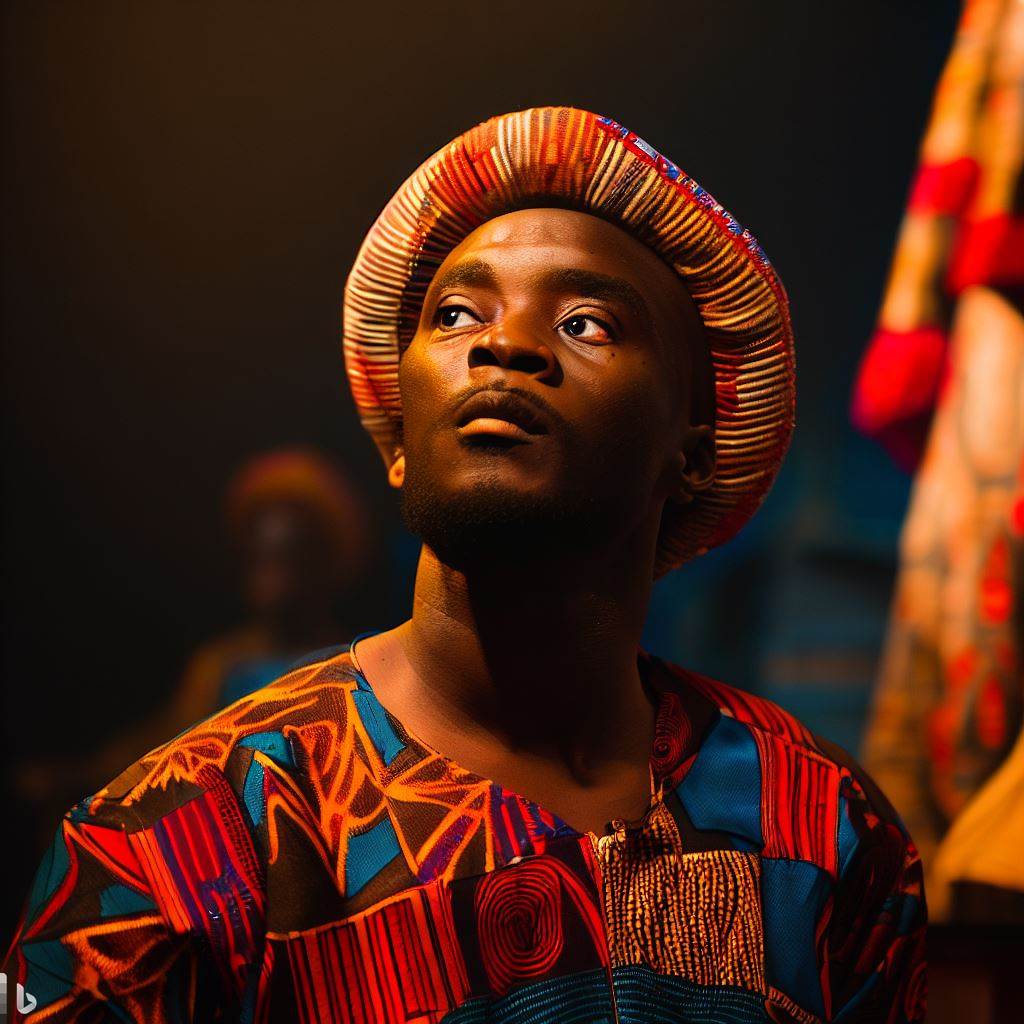
Cultural Challenges Faced by Nigerian Circus Performers
A. Preservation of cultural authenticity while catering to modern audiences
- Nigerian circus performers face the challenge of staying true to their cultural roots.
- They need to balance this authenticity with the need to entertain modern audiences.
- It is important for them to preserve traditional dance forms and music in their performances.
- At the same time, they must incorporate modern elements to appeal to a wider audience.
- This challenge requires a delicate balance between tradition and innovation.
B. Balancing traditional values and global entertainment trends
- Nigerian circus performers also face the challenge of adapting to global entertainment trends.
- They need to incorporate modern circus techniques while keeping traditional values intact.
- This requires understanding the changing tastes and preferences of their audience.
- Balancing tradition and innovation in their acts is crucial to their success.
- They need to find a way to stay relevant without compromising their cultural heritage.
C. Dealing with stereotypes and misrepresentations of Nigerian culture
- Nigerian circus performers often have to face stereotypes and misrepresentations of their culture.
- They need to work hard to overcome these prejudices and showcase the true diversity of Nigerian culture.
- Misconceptions about Nigerian culture can lead to misunderstandings and discrimination.
- It is important for performers to challenge these stereotypes through their performances.
- By presenting a true and authentic representation of Nigerian culture, they can break down barriers and promote cultural understanding.
Nigerian circus performers face several cultural challenges in their pursuit of entertaining modern audiences.
They need to balance their cultural authenticity with the need to appeal to global entertainment trends.
This requires them to preserve traditional values while incorporating modern techniques.
Moreover, they must also combat stereotypes and misrepresentations of Nigerian culture through their performances.
By navigating these challenges with integrity and creativity, Nigerian circus performers can showcase the richness of their culture to the world.
Read: Creating Hits: The Role of Music Producers in Nigeria’s Pop Scene
Find Out More: Nigeria’s Performers’ Agent Scene: An In-Depth Review
Impact of Culture on Audience Reception and Engagement
A. Importance of cultural familiarity and relevance in captivating audiences
- Nigerian circus performances that incorporate familiar cultural elements have a powerful impact on the audience.
- When the audience recognizes and connects with cultural references, their engagement and interest increase significantly.
- Cultural familiarity creates a sense of belonging and helps the audience relate to the performance on a personal level.
- The use of traditional music, costumes, and storytelling techniques enhances the overall experience for the audience.
B. Cultural appreciation and pride among spectators
- Nigerian circus performances allow audiences to celebrate their cultural heritage and take pride in their identity.
- Cultural appreciation promotes a positive atmosphere where spectators feel a sense of unity and pride.
- By showcasing Nigerian culture, circus performances contribute to the preservation and promotion of cultural traditions.
- The pride and appreciation felt by the audience bolsters their enthusiasm and support for the performers.
C. Creating meaningful connections with diverse audience members through cultural elements
- Nigerian circus performances provide an opportunity for diverse audience members to connect through shared cultural experiences.
- Cultural elements in the performance act as a bridge, bringing together people from different backgrounds and fostering dialogue.
- By recognizing and including various cultural aspects, the performance becomes inclusive and accessible to all audience members.
- The shared appreciation for Nigerian culture breaks down barriers and encourages understanding and empathy among spectators.
Culture plays a vital role in shaping the audience reception and engagement during Nigerian circus performances.
By incorporating familiar cultural elements, the performances captivate the audience and create a sense of cultural pride and appreciation.
This connection with the audience fosters a meaningful experience and promotes unity among diverse spectators.
The impact of culture on audience reception and engagement highlights the importance of embracing and celebrating cultural diversity in the context of circus performances.
Read: Budgeting for Sound Editing in Nigerian Film Industry
Benefits of Cultural Integration in Nigerian Circus Performance
A. Promoting cultural diversity and unity within Nigeria
One of the significant benefits of cultural integration in Nigerian circus performance is the promotion of cultural diversity and unity within the country.
Nigeria is home to over 250 ethnic groups, each with its unique culture, traditions, and art forms.
By incorporating diverse cultural elements into circus performances, artists create an inclusive space that celebrates the richness of Nigeria’s cultural heritage.
Through the integration of various cultural expressions, Nigerian circus performances break down barriers and foster greater understanding and appreciation among different ethnic groups.
This not only promotes a sense of unity but also helps to bridge the gap between diverse communities, fostering a stronger sense of national identity.
B. Preservation and revitalization of traditional art forms
Cultural integration within Nigerian circus performances also plays a crucial role in the preservation and revitalization of traditional art forms.
Many traditional Nigerian art forms, such as acrobatics, drumming, and dance, are incorporated into circus acts, ensuring their continuity and preventing them from being forgotten over time.
By integrating traditional art forms into circus performances, Nigerian artists are not only keeping their cultural heritage alive but also showcasing it to a broader audience.
This exposure helps to raise awareness and appreciation for these art forms, ensuring their continued existence and transmission to future generations.
C. Economic opportunities and tourism promotion through cultural exchange
The integration of diverse cultural elements in Nigerian circus performances also creates economic opportunities and promotes tourism through cultural exchange.
International tourists are drawn to unique cultural experiences, and circus performances that incorporate traditional Nigerian art forms can attract a significant number of visitors.
When tourists attend circus performances, they not only contribute financially to the artists and circus industry but also to the local economy.
Increased tourism promotes job creation and revenue generation, benefiting both the performers and the communities in which they operate.
Cultural exchanges facilitated through circus performances also have the potential to strengthen diplomatic and bilateral relationships between Nigeria and other countries.
As cultural ambassadors, Nigerian circus performers showcase their country’s cultural richness to the world, fostering goodwill and understanding.
Cultural integration in Nigerian circus performances offers numerous benefits to both the artists and the broader community.
It promotes cultural diversity and unity within Nigeria, preserves and revitalizes traditional art forms, and creates economic opportunities and tourism promotion through cultural exchange.
By embracing cultural integration, the Nigerian circus industry can continue to thrive and contribute to the growth and appreciation of the country’s rich cultural heritage.
Conclusion
Our study has highlighted the profound impact of culture on Nigerian circus performance.
Cultural understanding and inclusion play a significant role in the circus industry in Nigeria.
Nigerian circus performers incorporate traditional dances, costumes, and music, reflecting their rich cultural heritage.
The audience’s appreciation for these cultural elements enhances their overall circus experience.
Moreover, cultural values such as teamwork, discipline, and respect are instilled in Nigerian circus performers.
These values contribute to the professionalism and success of Nigerian circus acts.
However, challenges such as stereotypes and lack of resources hinder the growth of the circus industry in Nigeria.
It is crucial for stakeholders to address these challenges and promote cultural understanding and inclusivity.
By fostering an environment that respects and celebrates diverse cultural backgrounds, the circus industry can thrive.
Additionally, initiatives like cultural exchange programs can further enhance the cultural richness of Nigerian circus performances.
The integration of culture in circus acts not only attracts audiences but also fosters national unity and appreciation.
Culture plays a vital role in Nigerian circus performance, creating a unique and memorable experience for both performers and audience.
Embracing cultural diversity and inclusivity is essential for the sustainable growth and development of the circus industry in Nigeria.

